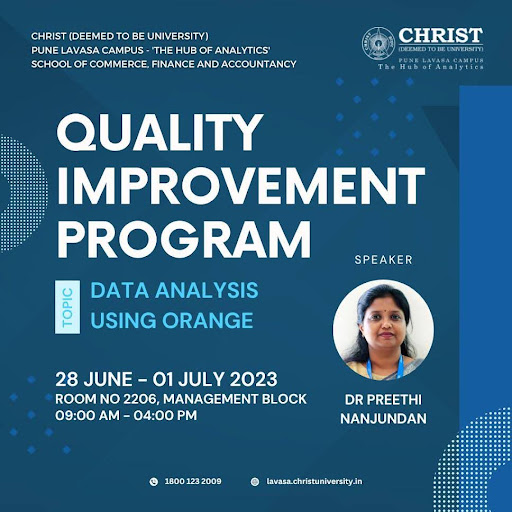QIP ON DATA ANALYSIS USING ORANGE
The Quality Improvement Program (QIP) took place from 28th June to 1st July 2023. The event was led by Dr. Preethi Nanjundan, who conducted a session on data analysis using Orange.
On the first day, participants learned about the benefits of using Orange and proceeded with the installation process. After a short break, they delved into Orange widgets, loading datasets, and creating their first workflow. Following a tea break, the participants familiarized themselves with the basics of data cleaning. The day concluded with an introduction to machine learning and training the first model.
Day two began with a session on research data and problem statements. The participants then took a short break before diving into importing data files and understanding the data. After a tea break, they engaged in hands-on activities with different models. The afternoon consisted of a lunch break and some time for office work. The participants continued building models and took a short break before focusing on making predictions and saving them.
On the third and final day, the participants dedicated the morning session to data collection for their research papers. Following a short break, they engaged in data analysis. After a tea break, the participants worked on the first draft of their research papers.
Throughout the QIP, participants had the opportunity to gain practical experience and enhance their knowledge in data analysis using Orange. By the end of the event, they were equipped with valuable skills and insights to apply in their research and work endeavors.
OUTCOMES OF THE EVENT:
The QIP on data analysis using Orange led by Dr. Preethi Nanjundan had several positive outcomes for the participants. Here are five notable outcomes:
● Enhanced understanding of Orange: Participants gained a comprehensive understanding of Orange, including its benefits and functionalities. They learned how to install the software, work with widgets, load datasets, create workflows, and utilize various features to analyze and manipulate data effectively.
● Practical experience in machine learning: The event provided participants with an introduction to machine learning concepts. They were trained in building models, making predictions, and saving the results. This hands-on experience equipped them with the skills needed to apply machine learning algorithms to real-world datasets.
● Improved research data analysis skills: Participants gained knowledge and expertise in analyzing research data. They learned how to import data files, understand data characteristics, and perform exploratory data analysis. These skills are essential for researchers to derive meaningful insights from their data.





Comments
Post a Comment